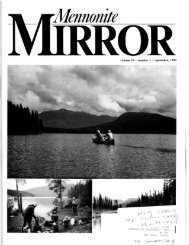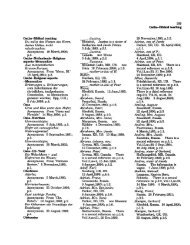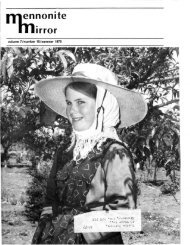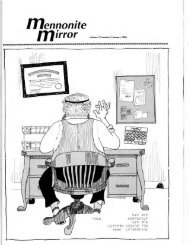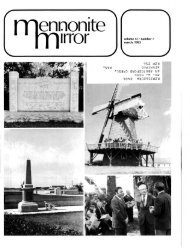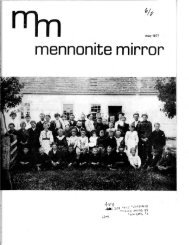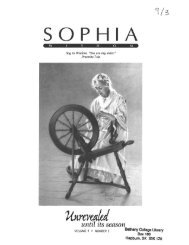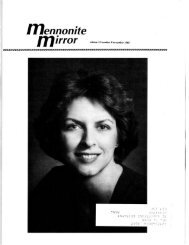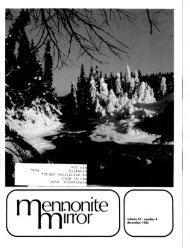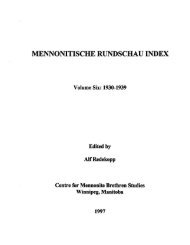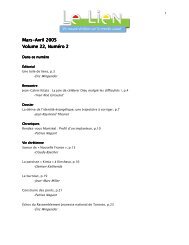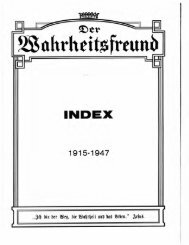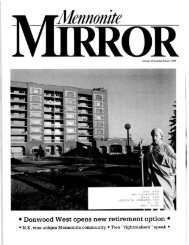No. 1 - Canadian Conference of Mennonite Brethren Churches
No. 1 - Canadian Conference of Mennonite Brethren Churches
No. 1 - Canadian Conference of Mennonite Brethren Churches
You also want an ePaper? Increase the reach of your titles
YUMPU automatically turns print PDFs into web optimized ePapers that Google loves.
Ben Horch: Dean <strong>of</strong> <strong>Mennonite</strong> conductors<br />
In June <strong>of</strong> last year Mr. Ben Ho rch retired<br />
formallv from his position as producer <strong>of</strong><br />
music programming at the <strong>Canadian</strong> Broadcasting<br />
Corporation, Winnipeg. Hi s retirement<br />
marked a milestone in a di stinguished<br />
career, for in 1973 Mr. Horch completed<br />
42 years <strong>of</strong> dedicated service to the cause <strong>of</strong><br />
serious music among <strong>Mennonite</strong>s. His retirement<br />
marked also the end <strong>of</strong> what has already<br />
come to be known among Manitoba<br />
<strong>Mennonite</strong>s as "the Ben Horch years."<br />
A brief resume elsewhere in these pages<br />
sets forth in chronological order the many<br />
positions that Mr. Horch has held since<br />
1932. He has indeed served as "a man for<br />
all seasons" _.. as voice teacher, as conductor<br />
and admini strator, as resource person, edito r<br />
and pr<strong>of</strong>essional broadcaster. Impressive as<br />
this published record is, it fails to capture and<br />
transmit those qualities for w hich most<br />
<strong>Mennonite</strong>s remember him.<br />
Thousa nds <strong>of</strong> Ma nitobans who have witnessed<br />
and heard a "Ben Horch production"<br />
associate him with Haydn's Creation or -<br />
more especially - with Handel's Messiah.<br />
What they recall most vividly are the dynamism<br />
and exuberance <strong>of</strong> the conductor, as<br />
well as the high artistic quality <strong>of</strong> the performances.<br />
The many hundreds <strong>of</strong> Manitobans<br />
wllo have sung in hi s choirs and played<br />
in his orchestras share memories that transcend<br />
in importance any formal music<br />
training tlley may have received from Mr.<br />
Horch; what they remember is the powerful<br />
impact <strong>of</strong> a flamboyant personality in the<br />
intensely dedicated exercise <strong>of</strong> his craft.<br />
These amateur musicians will never forget<br />
the electric excitement <strong>of</strong> a performance or<br />
the magic <strong>of</strong> a rehearsal.<br />
A Ben Horch rehearsal was a controlled<br />
"happening," a disciplined romp. To encourage<br />
receptiveness in his young musicians,<br />
or to hold their attention when fatigue set<br />
in, Mr. Horch would regale them with<br />
anecdotes (apocraphyl, surely ) <strong>of</strong> tone-deaf<br />
harpists, <strong>of</strong> young violin ists paralyzed with<br />
stage fright or <strong>of</strong> old cellists simply paralyzed.<br />
He pulled all the theatrical stops, and he<br />
was the master <strong>of</strong> comic timing.<br />
He was also a master <strong>of</strong> that dramatic<br />
technique, change <strong>of</strong> pace and mood. When<br />
anecdotes, witty word play and clever mime<br />
fell on deaf ears or lazy eyes, Mr. Horch<br />
12/ mennonite mirror / october 1974<br />
could alter the atmosphe re instantaneously<br />
wi th a stern phrase or a look <strong>of</strong> grave<br />
displeasure.<br />
On those rare occasions when neither<br />
the comic nor the serious modes were<br />
effective Mr. Horch played his trump card:<br />
the expression <strong>of</strong> paternal weariness and<br />
keen disappointment in those whom he had<br />
trusted. This last technique gave Mr. HOI"ch<br />
the psychological upper hand, and it never<br />
(in my experi ence) failed; we felt that we<br />
Ilad ve ry m uch wanted to please. He was,<br />
after all, our "Uncle Ben."<br />
The theatrical and dramatic skills so<br />
esse ntial to the in spiration and motivation<br />
<strong>of</strong> young music students surfaced in the<br />
young Ben Horch early in his high school<br />
days. For three consecutive years he pl ayed<br />
the roles <strong>of</strong> clowns and "licensed fools" in<br />
high school productions <strong>of</strong> Shakespeare's<br />
Twelfth Night and As You Like It.<br />
The director <strong>of</strong> the Anna Bronaugh Company<br />
(a pr<strong>of</strong>essional stock company from<br />
England) was so impressed with young<br />
Ben's comic skills that he <strong>of</strong>fered him a<br />
position as understudy to the lead ing man.<br />
"I skipped so many Wednesdays to go to<br />
the matinees that it affected my chemistry<br />
results," says an older Ben Horch, still<br />
sporting an impish grin that belongs in<br />
Shakespearean comedy. This early involvement<br />
in high school drama, the lure <strong>of</strong> the<br />
pr<strong>of</strong>essional stage ("$35 a month and all<br />
expenses! ") and later particiaption in Winnipeg<br />
Little Theatre nearly propelled Ben<br />
Horch into a career as s tage actor.<br />
Competing IV ith this strong interest in<br />
theatre - yet in many ways complementing<br />
it - was an interest in music, especially<br />
singing. After win ning a festival competition<br />
in the baritone class and finishing as runner-up<br />
to the Tudor Bowl, the teen-aged frequenter<strong>of</strong>-theatres<br />
was invited to join the Winnipeg<br />
Male Voice Choir. He was its youngest member<br />
at the t ime, and "an out-and-out<br />
Romanticist," to use his phrase. His earliest<br />
musical inspiration (excluding his home<br />
environment) derived from Hugh Ross, conductor<br />
<strong>of</strong> both the Winnipeg Male Voice<br />
Choir and the Winnipeg Philharmonic Choir,<br />
and later Arturo Toscanini's chorus master<br />
w ith the N.Y. Philharmonic and NBC<br />
by Lloyd Siemens<br />
The combined Winnipeg <strong>Mennonite</strong><br />
Symphony and the Winkler Schools<br />
Orchestra at one <strong>of</strong> their annual combined<br />
concerts at the Playhouse Theatre in the<br />
late 1940s.



